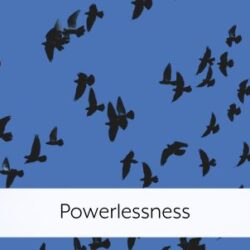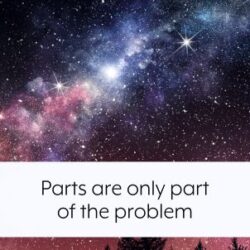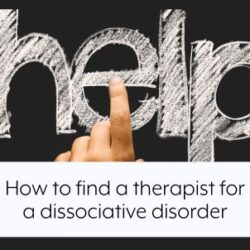
It’s scary to think you’ve ‘gone mad’. It’s scary to think you have some serious, incurable ‘mental illness’. It’s scary to not understand what on earth is going on in your brain.
And perhaps what’s even scarier is finding out that what is ‘wrong’ with you has a name: dissociative identity disorder.
I spent so much time wondering what was happening to me, and I was so desperate to find the answer, that I didn’t spend any time at all figuring out what would come next. I was so fixated on finding the right ‘label’ that I simply didn’t have a plan at all for what to do when I found that label.
This is true for lots of people. We get a diagnosis (officially, unofficially, definite, or suggested) of dissociative identity disorder (DID) and there’s relief that finally now the problem has a name. And then … and then we have no idea what to do next.
We may assume that once we know what it is, help will follow. Maybe we didn’t know how to get help for something whose name we didn’t know; surely, then, help will quickly follow once we name it …
But it doesn’t seem to work that like. DID is a double-edged sword. On the one hand, understanding your symptoms within the framework of DID can be really helpful – you can begin to understand why your brain behaves the way it does, you have an overarching narrative to explain your experience, and you know (at last) that you’re not alone.
But that doesn’t mean that any medical professional you speak to will have heard of DID, let alone be prepared to accept it as a diagnosis, or even provide ‘treatment’ for it.
And anyway, treatment – what treatment?
DID is not like a broken leg, where the problem is obvious: here’s a bone, and it’s broken. It needs to heal. To help that process, medical professionals operate on it or set it back in alignment, hold it in place, protect it with a cast, tell you to rest it, and then allow a natural process to ensue: if the conditions are right, the bone will regrow.
Then there are conditions like cancer. In most cases, this doesn’t resolve itself. It needs to be aggressively treated, targeted with drugs or radiotherapy or chemotherapy. If you don’t, it’s reasonably likely that the cancer will take over and win, and you’ll die. Treatment is usually essential.
Where does DID fall on this spectrum? Give it some rest, a bit of support, and it will naturally heal? Or does it need tackling aggressively so that it doesn’t get any worse, perhaps ending up as full-blown ‘insanity’?
The neat answer would be to say that it lies in between. But I don’t think that’s true. Because I don’t think the analogy between DID and physical illness works at all. I don’t think you can easily place psychological trauma within the paradigm of physical illness and what some people call ‘the medical model’.
With broken legs, there’s been damage to a bone. It’s snapped. With cancer, there’s a proliferation of cells with faulty DNA, multiplying out of control.
But DID is neither of these.
Dissociative identity disorder is not sickness.
DID is the adaptations our bodies and brains make to growing up in a perpetually threatening environment. They are what our brains and bodies are supposed to do. They haven’t malfunctioned. They’re not ill. They just weren’t ever supposed to suffer that kind of trauma.
This is important: DID is not an illness. Some would argue that it’s not even a disorder, and I understand why – because it’s the brain doing what the brain is supposed to be doing. That’s not a disorder, is it? No, it’s not – but the effects of it are ‘disordered’, in that they lead to symptoms in our everyday life that we’d rather not have (flashbacks, anyone?) I can live with calling it a disorder but I can’t live with calling it an illness. (Others are free to disagree.)
So in my way of thinking we can’t approach ‘treating’ DID like we’d treat a broken leg or cancer. The physical health / mental health analogy just doesn’t work.
DID is exactly what the brain is supposed to do when it’s faced with chronic trauma. The difficulty is that it leaves us with brains that adapted to a dangerous, life-threatening environment, but which are not so good at chillin’ out once that threat has passed.
So our brains adapted to danger, but now we’re not in danger any more, they behave in ways that are out of place and (to say the least) inconvenient. So the trick is to get them to adapt again … to safety.
That’s the crux of the task ahead of us. We have to learn how to feel safe in our bodies again. And that’s what ‘treatment’ in the form of therapy is all about:
- It’s about resetting our nervous system, turning down the sensitivity of the brain’s smoke alarm, which is set to react to the merest whiff of smoke.
- It’s about bringing our front brains online to calmly and patiently assess threat, rather than the trigger-happy reaction of our back brains which operate according to the mantra ‘better safe than sorry’.
- And it’s about finding a way of filing all of our traumatic memories so that they don’t keep bothering us in flashbacks and body memories. They keep coming into consciousness because they’re trying to alert us to the potential for danger.
So we need to reassure our brains that the danger is past, that we’ve heard the warnings, thank you very much, but that everyone can calm down and go to bed, because the war is over.
An interesting question then is: why doesn’t this process, this readjustment to life after the war, happen naturally?
Actually I think it probably does for a lot of people, and so over the long-term they don’t present with ‘mental health difficulties’. We’re only ever going to notice when it doesn’t happen. But there’s a sliver of hope in there – I think a lot of people who experience (at least ‘low’ levels of) trauma actually do recover from it ‘naturally’, that is without intervention. That says to me that recovery is standard operating procedure. It’s not something that we’ve got to artificially create – we just have to remove the blocks that are stopping it from happening.
One of the things that I’ve consistently found is that we ourselves are often the main impediment to recovery. That’s not therefore to blame us for not recovering – blame sucks, so let’s not go down that route! – but I’d suggest it’s part of the syndrome, that we get stuck in a vicious cycle: Abuse from outside sources has stopped, but we actually perpetuate it ourselves because it’s what we’re used to. It maintains the status quo, and ‘familiar’ always feels safer to our primitive brains than does ‘unfamiliar’. And it’s so normal to us that we might not even realise that we’re doing it.
But tune in and listen to your inner dialogue. What do you say to yourself? What’s the background commentary on everything you do and feel? Are you your biggest supporter, or your greatest enemy?
For many years, my inner dialogue was led by the most negative, critical and abusive voice imaginable. Eventually I realised that it was a projection of my mother and other abusers. But it was inside my head. And it was constant. It was a relentless stream of self-loathing. I hated myself for everything I did, thought, felt and wanted. When I had longings to be loved or understood, I despised myself and shamed myself for those feelings. When I made a mistake, I berated myself for my stupidity. When I tried to imagine success or a happy life, I reminded myself caustically that I didn’t deserve it.
It was incessant, this self-abuse. Over and over again. All day long. Beating myself up. Hating myself. Wanting to hurt myself. Wanting to kill myself. Feeling deeply ashamed of who and what I was. Never wanting to be me. Never giving myself a break. Always on my case, always criticising, always finding fault.
Eventually I came to realise that we can’t recover from abuse if we continue to abuse ourselves.
I was spending a lot of time and effort wanting therapy, paying for therapy, going to therapy. I wanted to ‘be better’. I wanted rid of my symptoms. I wanted life to be less painful. I wanted someone to come and cuddle me and love me and wrap me up in kindness, to make everything alright.
And yet at the same time I was abusing myself. It sounds crazy now – such a contradiction, such self-sabotage! And it’s one of the most distinctive elements of DID – the conflict within ourselves: parts of us pulling in one direction, parts pulling in another. And I was so used to that ambivalence, that paradox, that contradiction, that I didn’t even notice it. Doesn’t everyone hate themselves like this? I remember thinking.
If we want to recover from the effects of trauma, we have to stop traumatising ourselves. If we want to be able to feel safe again, we have to provide an atmosphere of safety, within ourselves. That is an essential, foundational step. Only if we’re willing to work towards that will any ‘treatment’ we receive be effective. Otherwise, it will be a case of one step forwards, and two steps back.
Often survivors blame the therapist or the therapy (or the absence of therapy) for a lack of progress, when actually we’re sabotaging our own efforts. Looking back, most times when I stalled in therapy and failed to make progress, it wasn’t because the therapist was getting it wrong, or the therapy was poor, or we weren’t using the latest whizz-bang therapeutic technique. It was because I was continuing to abuse myself.
We cannot learn to feel safe, and readjust to a safe environment, if we’re sleeping with the enemy. It just doesn’t make sense for our bodies and brains to lower the threat level and let our guards down, while the danger remains imminent. That’s often why we don’t make progress.
If we want to live without the after-effects of trauma – where our brains and bodies are geared to protect us from danger – then we have to remove the sources of that danger. Trying to feel safe while the abuser is still in the room is a futile exercise. How much more when the abuser is within our own head?
So we have to resolve our own self-abuse. We have to learn how to be compassionate and gracious towards ourselves. We have to – despite how much we might squirm even at the sound of it – learn how to love ourselves. We have to give ourselves the safety we need. This is the first step in recovering from trauma. There are many more, but a journey of a thousand miles begins with that first step.



20 Comments
Thank you.
Said so well…thank you
Thank you
The number of times I have berated myself for simple things e.g filler cap side, not able to park,for daring to have an opinion or a voice… how dare I!!
It took a long time to seek and accept help and to grow to realise I’m an ok person and to say its ok to take care of myself, yep I feel guilty but I know if I don’t I will get sucked into a negative spiral of self doubt!
I love the mantra cards I have even saved some as pictures on my phone so I always have them to hand.
So helpful, soothing and validating … thank you.
Best explanation I have come across of this in years.
We forget how powerful we are in our lives as society puts in places to seek help, get a quick fix, hand over the issue to others to put right.
self-care is lost in the drive to be put back together.
lightbulb moments of ‘Oh it me, I have to do the work etc’ is so empowering to do and watch people who suddenly want to work with you on this recovery path.
So true
Thank you! “I may be fractured; but all my parts are beautiful!”
Love from Nothern Norway
Thank you.
Thank you for this?
It is a warm feeling to read that someone else actually understands that our brain is not “defective” or “disordered” as many may believe. We spent a long time learning to reframe the thoughts in our head in order to begin believing the good stuff. Thank you, for these valuable insights.
Finally, someone speaking my language. I was feeling quite alone. I almost gave up hoping. I’m over fifty now. It’s almost too late.
Oh Linda, people often live into their 90’s these days, I’m a nurse, I know. You have at least half your life still ahead of you to enjoy. It’s never too late 😉
thank you so much for this someone who is on the same wave length has an understanding, this has opened my eyes so much thank again
“…..we can’t recover from abuse if we continue to abuse ourselves”
This is what stood out for me.
I know I am still doing that but I’m trying to stop it.
Thank you.
Really interesting! I stepped away from my war. I didn’t recognise myself anymore. It took time to adjust and the backlash from family of origin was brutal at times, still is if I were to pay it any attention. I don’t. I feel like I’m growing into myself again and it’s wonderful.
My self-sabotage is not about loathing myself, it’s about preventing I’ve to relife the traumas again. Dissociating is a kind way of keeping me in the here and now. I’ve been the most happiest, most healthiest when I was most dissociated from my past and my untarnished soul could shine through.
Maybe because I became multiple personalities at birth and never having an Apperently Normal Personality. Only lots of personalities trying to fit. Dissociating cost tremendous amounts of energy. That’s what sucks about child-abuse. Happy times, relaxing, makes for old shit resurfacing. Therefore causing a catch 22 and preventing relaxation and happiness. When there is just too much to deal with it and be done with it, one needs another way of learning to deal with it chronically: alternating facing and dissociating.
Thank you for this and thank you for your comment Janneke.
I’m beginning to realise that in protecting myself I’m preventing myself from doing the things I want to do.
I’ve lost the “dare to” along the way.
Time to surgically remove the bandages that bind me bit by bit, very gently releasing myself back out in the world. I’ve taken some ground, but that fear has to transform into excitement.
A very solid approach and write on D.ID with out falling into the abyss or creeping down any rabbit holes regarding what we do not know, thanks for this sharing Peace to you!, Maria
Oh, this word is so on point. Everything seems to be coming together in just what I have read so far. Thank you I have been searching for information like this for a long time.
My Disassociate Identity Disorder,
The Abused Child, The Spiritual Villain, The Real Alec, The Spiritual Warrior Alex, and anything else.